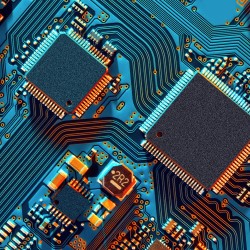 LOS ALAMITOS, Calif., 12 December 2023–The broad utilization of the IEEE International Roadmap for Devices and Systems (IRDS) is influencing the various Chips Acts worldwide. Initiatives in Europe, Japan, and the US are engaging the IRDS roadmap for guidance as their activities develop, said Tom Coughlin, President of IEEE. As part of the ongoing roadmap work, the most recent IRDS publication, the IRDS 2023 Update, is being published online and available publicly.
LOS ALAMITOS, Calif., 12 December 2023–The broad utilization of the IEEE International Roadmap for Devices and Systems (IRDS) is influencing the various Chips Acts worldwide. Initiatives in Europe, Japan, and the US are engaging the IRDS roadmap for guidance as their activities develop, said Tom Coughlin, President of IEEE. As part of the ongoing roadmap work, the most recent IRDS publication, the IRDS 2023 Update, is being published online and available publicly.
The IRDS is known for mapping the way forward for the entire microelectronics industry, and recent Chips Acts and semiconductor initiatives in Japan, Europe and the US have taken advantage of the roadmap reports. In particular, the IRDS was adopted under the guidance of Yoshihiro Hayashi, chair of Systems and Devices Roadmap of Japan (SDRJ), and the IRDS International Roadmap Committee (IRC) representative for Japan, as the reference document for their initiatives. In Japan the Ministry of Economy, Trade and Industry (METI) compiled and published the “Strategy for Semiconductors and the Digital Industry” in 2021. Resulting Japanese activities include the Super Clean Room (SCR) in Tsukuba with TSMC adding a 3DIC center adjacent to the SCR in July 2022.
“The new ecosystem of the electronics’ industry is driven by system integrators that design products enabled by multiple semiconductor technologies. The role of the IRDS in identifying the fundamental building blocks in the electronics industry spanning from devices to systems and from systems to devices is critical for international collaboration for advanced design, function, compute and manufacturing of future devices and systems,” said Yoshiro Hayashi, Chairperson, SDRJ, Visiting Professor, Faculty of Science and Technology, KEIO University and Invited Senior Researcher, TIA Central Office.
In May 2022 Europe adopted the IRDS as its reference document when it launched the European Chips Act, and formed the International Cooperation on Semiconductors (ICOS) initiative, chaired by Francis Balestra of SiNANO, the IRDS International Roadmap Committee representative for Europe.
“International cooperation is key for speeding up technological innovation. The IRDS plays a decisive role in this area and helps identify possible next generation and emerging technologies in advanced computation and functionalities for future systems and applications. This joint effort will be instrumental for the new electronics’ industry and in the digitalization of many domains to reduce footprint, as well as the electronic monitoring targeting societal challenges using sustainable electronic technologies,” said Balestra.
Fundamental recommendations of the IRDS to US organizations were brought forth as far back as April 2021 by Paolo Gargini, Chairman of IRDS, and ultimately introduced in the US Chips Act via its Industry Advisory Committee (IAC). This adoption was reported in a document published by NIST on April 25, 2023, titled “ A Vision and Strategy for the NSTC.” Technologies recommended by IRDS in the NIST document include the following categories: power electronics, radio frequency, photonics, sensors, bioelectronics, design tools, among others.
The original semiconductor roadmap, the International Technology Roadmap for Semiconductors (ITRS), was a critical resource worldwide that was recognized by the World Semiconductor Council (WSC). A memorandum of understanding (MOU) between the ITRS and Rebooting Computing Initiative ensured a logical migration of all ITRS groups into the IEEE effort, and the continuation of the roadmap was renamed to the “International Roadmap for Devices and Systems,” (IRDS), on May 4, 2016, thus expanding the new and broader mission of the IRDS.
The IRDS, hosted by the IEEE Computer Society (IEEE CS) within the Task Force for Rebooting Computing (TFRC), is supported by eight IEEE Societies. The SiNANO Institute, European Academic and Scientific Association for Nanoelectronics and the Systems and Devices Roadmap of Japan (SDRJ) are founding members of IRDS.
For more information and to access the IRDS roadmaps, email irds_info@ieee.org and visit the website https://irds.ieee.org.
About the IEEE Computer Society
Engaging computer engineers, scientists, academia, and industry professionals from all areas of computing, the IEEE Computer Society (CS) sets the standard for the education and engagement that fuels continued global technological advancement. Through conferences, publications, and programs, and by bringing together computer science and engineering leaders at every phase of their career for dialogue, debate, and collaboration, IEEE CS empowers, shapes, and guides the future of not only its members, but the greater industry, enabling new opportunities to better serve our world. For more information visit https://www.computer.org.
About IEEE
IEEE is a large, global professional organization dedicated to advancing technology for the benefit of humanity. Through its highly cited publications, conferences, technology standards, and professional and educational activities, IEEE is the trusted voice on a wide variety of areas ranging from aerospace systems, computers and telecommunications to biomedical engineering, electric power and consumer electronics. Learn more at http://www.ieee.org.